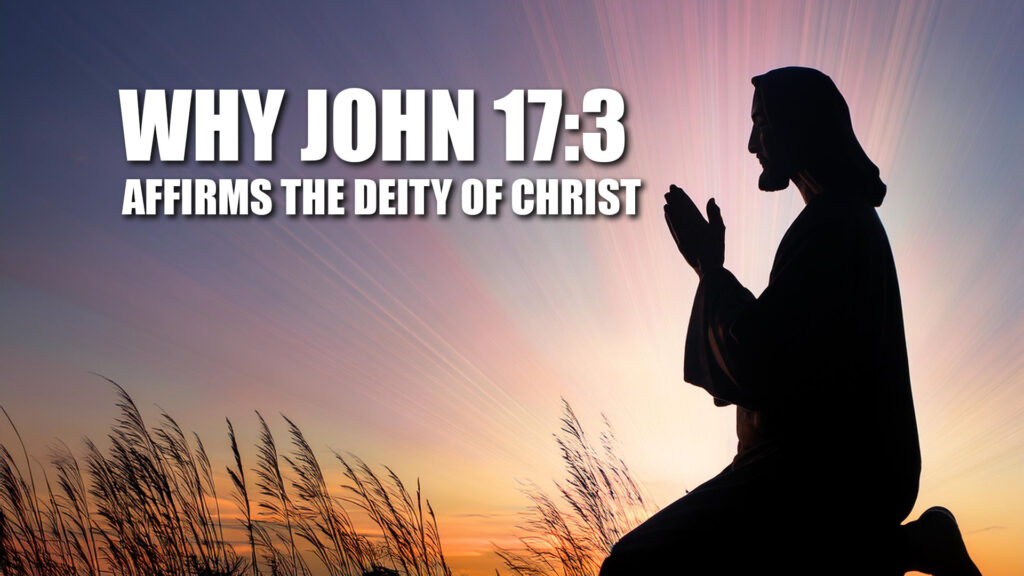
By AC
This verse is often cited to challenge the doctrine of the Trinity, yet it does not actually contradict it. In fact, it aligns with Trinitarian teaching. Those who use this verse against the Trinity may either misunderstand what the doctrine truly teaches or, in some cases, may be intentionally misrepresenting the biblical text. Every answer below is a thorough examination of John 17:3 and John 5:44 and why the argument doesn’t work to try to refute the trinity. (See this article as well)
OBJECTION
Jesus cannot be God because the verse states that only the Father is the true God. In this context, Jesus is praying to God, His Father, and explicitly identifies the Father as the only true God, thereby excluding the Son from divinity. This challenges and undermines the Christian doctrine of the Trinity.
- “And this is eternal life, that they know you, the only true God, and Jesus Christ whom you have sent.” – John 17:3
- “How can you believe, who receive honor from one another, and do not seek the honor that comes from the only God?” – John 5:44 (NKJV)
RESPONSE
Rebuttal of Ironic Phraseology: Arguing the Father Out of Deity
The theological reasoning used to interpret this verse often backfires quickly. Just as opponents cite John 5:44; 17:3 to argue that Jesus is not God, but only the Father. You can apply this same logic to other verses that, in fact, exclude the Father from deity and affirm Jesus as God. If the person is content in there interpretation. This approach demonstrates how their interpretation of John 5:44; 17:3 is flawed and highlights a lack of critical thinking, often driven by personal biases.
“When I encounter this argument, I often respond with this argument first, especially if the person approaches with a hostile attitude, as is common online with those seeking a “gotcha” moment. My immediate reply when someone quotes John 5:44; 17:3 is usually something like, “You’ve just argued the Father out of deity” or “You just said Jesus is God without realizing it.” This response tends to prompt curiosity, and they’ll often ask what I mean or deny what you said. That’s when I show them how the logic they’re applying to John 17:3 actually backfires illustrating my point with two verses (preferably the first one I’m about to share).” – AC
The reason why you want to use this argument is because your opponent is focused on the words “only” and “true” in Jn. 5:44; 17:3. The word only is monon (root word – monos) μόνον in Greek in John 17:3 and in John 5:44 monou. Both deriving from the word monos μόνος, and is a adjective to describe a noun or pronoun. In biblical theology, this word does not necessarily imply absolute exclusion as the word ‘only’ might suggest today, but rather serves to emphasize certain nouns or pronouns in a specific manner, depending on the context. This becomes apparent in Christian theology when aligned with the broader context of Scripture. With that in mind, the word only can convey exclusivity, but it doesn’t necessarily have to it depends on the context and intended meaning.
“4 For certain people have crept in unnoticed who long ago were designated for this condemnation, ungodly people, who pervert the grace of our God into sensuality and deny our only (monon) Master and Lord, Jesus Christ. 5 Now I want to remind you, although you once fully knew it, that Jesus, who saved a people out of the land of Egypt, afterward destroyed those who did not believe.” – Jude 4-5 (interlinear)
In verse 4, Jesus is referred to as the “only Master and Lord, Jesus Christ.” Applying the same logic used in the John 17:3 argument would imply that only Jesus, and not the Father, is Master and Lord—which is clearly illogical and instantly undermines your opponents argument. The case becomes even stronger in verse 5, which states, “Jesus, who saved a people out of the land of Egypt,” indicating Jesus’ pre-existence as the Savior of His people. In the Old Testament, it was God Almighty who performed this act, supporting the understanding that Jesus is indeed divine. Further evidence comes from the earliest manuscript we have on Jude, Papyrus 72, which uses the phrase theos Christos, meaning “the God Christ.” (Here is additional information in this article regarding Jude 4-5)
This argument quickly unravels when we apply critical thinking. It’s similar to insisting that it is “only true” 2 + 2 equal 4, while ignoring that 1 + 3 also equals 4. The logic doesn’t hold, as it assumes that the word “only” always excludes other possibilities, which isn’t necessarily true depending on the context. Theologically this follows the same line of reasoning when it comes to the trinity. You can also apply this logic on to 1 Timothy 6:14-16. This passage not only describes Jesus as dwelling in unapproachable light, highlighting His divine nature, but also affirms that he is the “only sovereign.” This doesn’t imply that the Father is no longer sovereign. However, if we apply the objector’s logic consistently, it would have to mean that. Which clearly doesn’t make any coherent sense. To those that try to say 1 Timothy 6:14-16 is about Jesus would be lying, because the nearest intercedent in the text is Jesus in context.
- “14 to keep the commandment unstained and free from reproach until the appearing of our Lord Jesus Christ, 15 which he will display at the proper time—he who is the blessed and ONLY (monos) SOEREIGN, the King of kings and Lord of lords, 16 who alone has immortality, who dwells in unapproachable light, whom no one has ever seen or can see. To him be honor and eternal dominion. Amen.” – 1 Timothy 6:14-16 (ESV)
The Father’s and the Son’s Nature as the Only True God
“And this is eternal life, that they know you, the only true God, and Jesus Christ whom you have sent.” – John 17:3 (ESV)
While the phrase “only true” is not grammatically connected to “you” but rather to “God,” we will explore the grammatical structure in more depth later in this article. The focus here is on understanding the Father as the “only true God,” acknowledging His unique, true essence. In alignment with the rest of Scripture, the Son is begotten and proceeds from the Father, sharing in His divine nature. All quoted verses, unless specified otherwise, are from the NASB translation.
- John 3:16-17 – “For God so loved the world, that He gave His only (begotten) Son, that whoever believes in Him shall not perish, but have eternal life. For God did not send the Son into the world to judge the world, but so that the world might be saved through Him.”
- John 8:42 – “Jesus said to them, ‘If God were your Father, you would love Me, for I came forth from God and am here; for I have not even come on My own, but He sent Me.'”
- John 16:28 – “I came forth from the Father and have come into the world; I am leaving the world again and going to the Father.”
- John 13:3 – “Jesus, knowing that the Father had given all things into His hands, and that He had come forth from God and was going back to God…”
- John 17:8 – “For the words which You gave Me I have given to them; and they received them and truly understood that I came forth from You, and they believed that You sent Me.”
- John 1:14 – “And the Word became flesh, and dwelt among us, and we saw His glory, glory as of the only Son from the Father, full of grace and truth.”
- John 1:18 – “No one has seen God at any time; the only God who is in the bosom of the Father, He has explained Him.“
- John 6:38 – “For I have come down from heaven, not to do My own will, but the will of Him who sent Me.”
- John 7:29 – “I know Him, because I am from Him, and He sent Me.”
- 1 John 4:9 – “In this the love of God was made manifest among us, that God sent his only Son into the world, so that we might live through him.” (ESV)
- Galatians 4:4 – “But when the fullness of the time came, God sent forth His Son, born of a woman, born under the Law…”
- Hebrews 1:3 – “And He is the radiance of His glory and the exact representation of His nature, and upholds all things by the word of His power. When He had made purification of sins, He sat down at the right hand of the Majesty on high…”
With this understanding of the Trinity, Christians affirm that Jesus is eternally begotten from the very essence of the Father. This belief asserts that the Son, begotten from the Father’s essence, is uncreated, as nothing within God is created. This truth applies equally to both the Son and the Holy Spirit. As emphasized by these Church Fathers and theologian convert, particularly in relation to the procession of Jesus.
- Ignatius of Antioch (c. 35–107 AD)
- “There is one Physician who is possessed both of flesh and spirit; both made and not made; GOD EXISTING IN FLESH; true life in death; both of Mary and of God; first passible and then impassible, even Jesus Christ our Lord.” — Letter to the Ephesians, Chapter 7, (bold emphasis are mine)
- Justin Martyr (c. 100–165 AD)
- “I shall attempt to persuade you that there is, and that there is said to be, another God and Lord subject to the Maker of all things; who is also called an Angel, because He announces to men whatsoever the Maker of all things—above whom there is no other God—wishes to announce… He came forth from the Father, yet was not created.” — Dialogue with Trypho, Chapter 56, (bold emphasis are mine)
- “He appeared in human form to Joshua the son of Nave (Nun). For He can be called by all those names, since He ministers to the Father’s will, and since He was begotten of the Father by an act of will; just as we see happening among ourselves: for when we give out some word, we beget the word; yet not by abscission, so as to lessen the word [which remains] in us, when we give it out: and just as we see also happening in the case of a fire, which is not lessened when it has kindled [another], but remains the same; and that which has been kindled by it likewise appears to exist by itself, not diminishing that from which it was kindled. The Word of Wisdom, who is Himself this God begotten of the Father of all things, and Word, and Wisdom, and Power, and the Glory of the Begetter” (Dial. with Trypho 61).
- “For the statement in the law, ‘Cursed is every one that hangs on a tree,’ Deuteronomy 21:23 confirms our hope which depends on the crucified Christ, not because He who has been crucified is cursed by God, but because God foretold that which would be done by you all, and by those like to you, who do not know that this is He who existed before all, who is the eternal Priest of God, and King, and Christ.” (Dial. with Trypho 96).
- “He appears arrayed in such forms as the Father pleases; and they call Him the Word, because He carries tidings from the Father to men: but maintain that this power is indivisible and inseparable from the Father, just as they say that the light of the sun on earth is indivisible and inseparable from the sun in the heavens; as when it sinks, the light sinks along with it; so the Father, when He chooses, say they, causes His power to spring forth, and when He chooses, He makes it return to Himself. In this way, they teach, He made the angels. But it is proved that there are angels who always exist, and are never reduced to that form out of which they sprang. And that this power which the prophetic word calls God, as has been also amply demonstrated, and Angel, is not numbered [as different] in name only like the light of the sun but is indeed something numerically distinct, I have discussed briefly in what has gone before; when I asserted that this power was begotten from the Father, by His power and will, but not by abscission, as if the essence of the Father were divided; as all other things partitioned and divided are not the same after as before they were divided: and, for the sake of example, I took the case of fires kindled from a fire, which we see to be distinct from it, and yet that from which many can be kindled is by no means made less, but remains the same” (Dial. with Trypho 128).
- “The Lord created me the beginning of His ways for His works. From everlasting He established me in the beginning, before He formed the earth, and before He made the depths, and before the springs of waters came forth, before the mountains were settled; He begets me before all the hills.’ When I repeated these words, I added: You perceive, my hearers, if you bestow attention, that the Scripture has declared that this Offspring was begotten by the Father before all things created; and that which is begotten is numerically distinct from that which begets, any one will admit” (Dial. with Trypho 129).
- Irenaeus of Lyons (c. 130–202 AD)
- “For with Him were ALWAYS present the Word and Wisdom, the Son and the Spirit, by whom and in whom, freely and spontaneously, He made all things, to whom also He speaks, saying, ‘Let Us make man after Our image and likeness.” — Against Heresies, Book 4, Chapter 20, (bold emphasis are mine)
- “Now that there was a Son of God, and that He existed not only before He appeared in the world, but also before the world was made… And again the same says: Blessed is he who was, before he became man… For together with the world the stars were made… For God, the Son was (as) the beginning before the creation of the world.” — Demonstration of the Apostolic Preaching, Chapter 43, (bold emphasis are mine)
- Tertullian (c. 160–225 AD)
- “For God sent forth the Word, as the Paraclete also declares, just as the root puts forth the tree, and the fountain the river, and the sun the ray. For these are προβολαί, or emanations, of the substances from which they proceed. I should not hesitate, indeed, to call the tree the son or offspring of the root, and the river of the fountain, and the ray of the sun; because every original source is a parent, and everything which issues from the origin is an offspring. Much more is (this true of) the Word of God, who has actually received as His own peculiar designation the name of Son. But still the tree is not severed from the root, nor the river from the fountain, nor the ray from the sun; nor, indeed, is the Word separated from God. Following, therefore, the form of these analogies, I confess that I call God and His Word — the Father and His Son — two. For the root and the tree are distinctly two things, but correlatively joined; the fountain and the river are also two forms, but indivisible; so likewise the sun and the ray are two forms, but coherent ones. Everything which proceeds from something else must needs be second to that from which it proceeds, without being on that account separated. Where, however, there is a second, there must be two; and where there is a third, there must be three. Now the Spirit indeed is third from God and the Son; just as the fruit of the tree is third from the root, or as the stream out of the river is third from the fountain, or as the apex of the ray is third from the sun.” — Against Praxeas, Chapter 8, (bold emphasis are mine)
- “For before all things God was alone — being in Himself and for Himself universe, and space, and all things. Moreover, He was alone, because there was nothing external to Him but Himself. Yet even not then was He alone; for He had with Him that which He possessed in Himself, that is to say, His own Reason. For God is rational, and Reason was first in Him; and so all things were from Himself. This Reason is His own Thought (or Consciousness) which the Greeks call λόγος, by which term we also designate Word or Discourse… For although God had not yet sent out His Word, He still had Him within Himself, both in company with and included within His very Reason, as He silently planned and arranged within Himself everything which He was afterwards about to utter through His Word…Thus, in a certain sense, the word is a second person within you, through which in thinking you utter speech, and through which also, (by reciprocity of process,) in uttering speech you generate thought. The word is itself a different thing from yourself. Now how much more fully is all this transacted in God, whose image and likeness even you are regarded as being, inasmuch as He has reason within Himself even while He is silent, and involved in that Reason His Word!” — Against Praxeas (Chapter 5)
The Context
Reading the context of just the first five verses in the passage quickly disproves the entire argument with only a small amount of reasoning.
- “When Jesus had spoken these words, he lifted up his eyes to heaven, and said, “Father, the hour has come; glorify your Son that the Son may glorify you, 2 since you have given him authority over all flesh, to give eternal life to all whom you have given him. 3 And this is eternal life, that they know you, the only true God, and Jesus Christ whom you have sent. 4 I glorified you on earth, having accomplished the work that you gave me to do. 5 And now, Father, glorify me in your own presence with the glory that I had with you before the world existed.” – John 17:1-5 (ESV)
By closely examining the text, we can identify several key details. Chapter 17 is preceded by 16 chapters and followed by four more, emphasizing its place within the broader context of John’s Gospel. Isolating passages without considering their context is not an effective approach to understanding their meaning. In this discussion, we will focus specifically on the five verses of John 17:3. Additionally, the following articles provide valuable insights and alternative strategies for addressing related objections.
“I recommend avoiding an in-depth explanation of John 17:3 unless the person shows genuine interest in learning. If the conversation naturally leads to specific points, focus on highlighting the ones that are most relevant. Choose only the necessary points to guide the discussion.” – AC
Verse 1: Asking To Be Glorified
- “…Father, the hour has come; glorify your Son that the Son may glorify you.”
In this powerful statement, Jesus asks God to glorify Him first, so that He can, in turn, glorify God. This request is not only significant in its theological implications but also in the way it sets Jesus apart from other prophets. It would be inconceivable for any human to make such a request, as asking God to glorify oneself is seen as disrespectful and inappropriate. This request by Jesus, however, highlights His unique relationship with the Father. Moreover, in verse 5, Jesus affirms that He shared divine glory with the Father before the creation of the cosmos, further emphasizing His divine nature. This stands in stark contrast to the understanding of prophets in Islam, where no prophet would claim to share in the divine glory of God. Can Muhammad say “Allah glorify me, so that I (your son) may glorify you?” What a demand Muhammad!
Rebuttal to a Muslim (A2): Although it is not typically a central focus of their argument, it is worth noting that Muslims doctrinally reject the idea of Allah being a father in any sense, despite new age arguments. This distinction highlights a significant theological difference between Islamic and Christian views of God. Article below.
According to Jesus the only true God is the Father who glorifies his Son, i.e. Jesus Christ. However, according to Muhammad Allah is not Jesus’ father and is, in fact, not a father to anyone. Here is what Muhammad said in his Quran:
And the Jews say: Uzair is the son of Allah; and the Christians say: The Messiah is the son of Allah; these are the words of their mouths; they imitate the saying of those who disbelieved before; may Allah destroy them; how they are turned away! S. 9:30
And the Jews and the Christians say: We are the sons of Allah and His beloved ones. Say: Why does He then chastise you for your faults? Nay, you are mortals from among those whom He has created, He forgives whom He pleases and chastises whom He pleases; and Allah’s is the kingdom of the heavens and the earth and what is between them, and to Him is the eventual coming. S. 5:18
And they say: The Beneficent has taken (to Himself) a son. Certainly you have made an abominable assertion The heavens may almost be rent thereat, and the earth cleave asunder, and the mountains fall down in pieces, That they ascribe a son to the Beneficent. And it is not worthy of the Beneficent that He should take (to Himself) a son. There is no one in the heavens and the earth but will come to the Beneficent God as a servant. S. 19:88-93
Verse 2: Jesus Gives Eternal of Life
- “since you have given him authority over all flesh, to give eternal life to all whom you have given him.” – John 17:2
Jesus has been entrusted with ultimate authority over all humanity (Daniel 7:13-14), empowering Him to grant eternal life to all who come to Him in faith. This profound truth is a central theme of the Gospel of John, where Jesus consistently declares that eternal life is a gift for those who believe in Him (see John 3:16; 5:24; 6:40; 10:28). Through His divine authority and redemptive work, Jesus extends this offer of eternal life to everyone who trusts in Him as the Son of God.
He is also given authority over all flesh, something God only has the ability to do as mentioned in Jeremiah 32:26-27. Ironically, it is the Word of the Lord in Jeremiah that speaks to Jeremiah which is identified as Jesus in the New Testament John 1:1-3, 14; Luke 24:19; 1 John 1:1-4; Revelations 19:13.
With all this in mind it says that Jesus can give eternal life to those that have been given to him. Something only God can do.
- 27 My sheep hear my voice, and I know them, and they follow me. 28 I give them eternal life, and they will never perish, and no one will snatch them out of my hand. 29 My Father, who has given them to me, is greater than all, and no one is able to snatch them out of the Father’s hand. 30 I and the Father are one.”
Jesus clearly says that He has the power to give eternal life to those who follow Him, and no one can take them away from Him. Only God can give eternal life, and in this passage, both Jesus and the Father are shown doing the same thing. Even by what the Quran teaches, this shows that Jesus has a special connection to God.
Why Was He Given Authority If He Is God?
Jesus was granted authority as the Son of Man, a title signifying His destined role to receive dominion from the Ancient of Days, as foretold in Daniel 7:13-14. In the Gospels, Jesus frequently refers to Himself as the “Son of Man,” a term that is far more than a reference to humanity; it carries profound divine significance. For a deeper understanding of why this title is recognized as divine, I recommend exploring the following resources: 1, 2, 3.
Receiving authority or serving another does not diminish one’s value or nature. If servitude made someone lesser, we might as well consider ourselves no better than animals, simply because we serve others. Critics who deny Jesus’ divinity often focus on passages emphasizing His role as a servant while neglecting the numerous passages that affirm His divine nature and authority.
Verse 5: Jesus divine pre-existence
“And now, Father, glorify me in your own presence with the glory that I had with you before the world existed.” – John 17:5
Jesus clearly states that He shared glory with the Father before the world existed. When we compare this with John 1:1-3, it becomes evident that Jesus is the Creator of everything in existence. The English word “world” translates to kosmon in Greek, derived from the root kosmos, which can mean the universe or cosmos.
Additionally, John 12:37-41 (cf. Isaiah 6:10) reveals that the glory Isaiah witnessed in his vision (Isaiah 6:1-10) was, in fact, the glory of Jesus. Isaiah saw YHWH the God of Israel seated on His throne, and John identifies this glory as belonging to Jesus, affirming His divine identity. The Holy Spirit is also said to have spoken to Isaiah in Isaiah 6:9-10 in Acts 28:25-27
Contradiction? Someone might bring up Isaiah 42:8 to say that John 17:5 is contradiction; Isaiah 42:8 says:
- “I am the LORD, that is My name; And My glory I will not give to another, Nor My praise to carved images.” – Isaiah 42:8 (NKJV)
However, for those who understand the Trinity, this does not present a contradiction. Yahweh is not sharing His glory with Jesus as though they are separate beings. Rather, Jesus, along with the Father and the Holy Spirit, is Yahweh. God is not one person and one being but one being in three persons. These three persons—Father, Son, and Holy Spirit share the same divine name, Yahweh, as the one true God. Consequently, they also share the same divine glory, as they are united in essence and exist as the one God.
Grammar
The grammatical issue is addressed briefly in Rebuttal of Ironic Phraseology: Arguing the Father Out of Deity. Now, we must examine the grammar of John 5:44 and 17:3 more closely. In both cases, the word only (Greek: monon/monou) functions as an adjective predicated to the noun or pronoun it modifies—in these instances, the word God. This grammatical construction is fully consistent with Trinitarian theology.
However, some individuals misinterpret this by treating the word God as if it is synonymous with Father, which is not the same thing. So people who misinterpret the passage use God as though it exclusively means Father, when in fact Trinitarian theology makes a distinction between the person of the Father and the divine nature shared by the Father, Son, and Holy Spirit. This is a classic example of the equivocation fallacy—confusing two different meanings of a word. While the context indeed refers to the Father, this does not exclude the Son from deity. Rather, it affirms that the Father is truly God without denying the full divinity of Jesus Christ or the Holy Spirit. Within Trinitarian theology, such affirmations are not mutually exclusive but harmonious.
Furthermore, in John 17:3, the adjective monon (only) modifies the true God, and the conjunction kai (and) joins Jesus Christ with the true God as the one who was sent. Grammatically, one could read the construction as attributing the adjective not solely to the Father, but inclusively to both God and Jesus Christ, depending on the theological and syntactical framework. The conjunction kai links the two, not to contrast them, but to unite them in the structure of the sentence.
The Same John Says
In 1 John 5:20, it also mentions Jesus being also the true God.
- “And we know that the Son of God has come and has given us understanding, so that we may know him who is true; and we are in him who is true, in his Son Jesus Christ. He is the true God and eternal life.” – 1 John 5:20 (ESV)
No one can argue that this refers to the Father, as the context clearly identifies Jesus Christ as the nearest intercessor in the text. Additionally, the pronoun “he” (οὗτός) is in the nominative case, pointing to the subject, which is Jesus Christ within this context. It is also important to note that the original manuscripts lacked periods and other punctuation. John also says at the beginning of this Epistle about the Word which he has already identified as Jesus Christ in John 1:1-3, 14.
- “That which was from the beginning, which we have heard, which we have seen with our eyes, which we looked upon and have touched with our hands, concerning the word of life— 2 the life was made manifest, and we have seen it, and testify to it and proclaim to you the eternal life, which was with the Father and was made manifest to us— 3 that which we have seen and heard we proclaim also to you, so that you too may have fellowship with us; and indeed our fellowship is with the Father and with his Son Jesus Christ.” – 1 John 1:1-3 (ESV)
Considering all that John has presented in his writings, Jesus is clearly portrayed as the manifestation of God’s love. In 1 John 4:8-9, John states that “God is love” and demonstrates this love by sending His Son into the world so that we might live through Him. This reveals not only that Jesus embodies God’s love in action but also that His existence is inseparable from the divine nature of love itself.
If God’s essence is love, and Jesus is the manifestation of God’s essence, it follows that Jesus exists as both God and the embodiment of love simultaneously. This underscores the unity of Jesus with the Father and highlights His role as the perfect revelation of God’s love to humanity.
- “8 Anyone who does not love does not know God, because God is love. 9 In this the love of God was made manifest among us, that God sent his only Son into the world, so that we might live through him.” – 1 John 4:8-9
RELATED ARTICLES






Pingback: John 17:3 True Interpretation - Answers For Christ